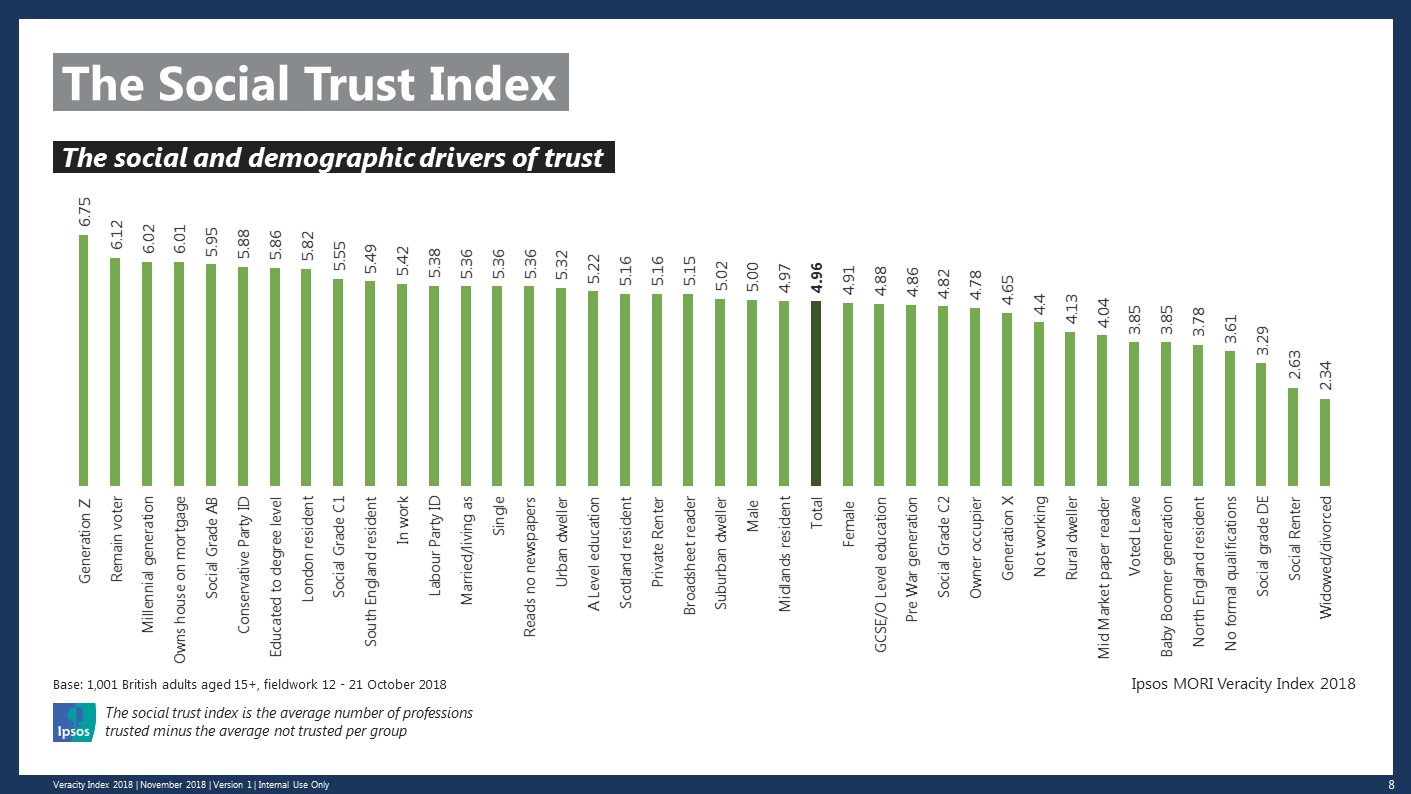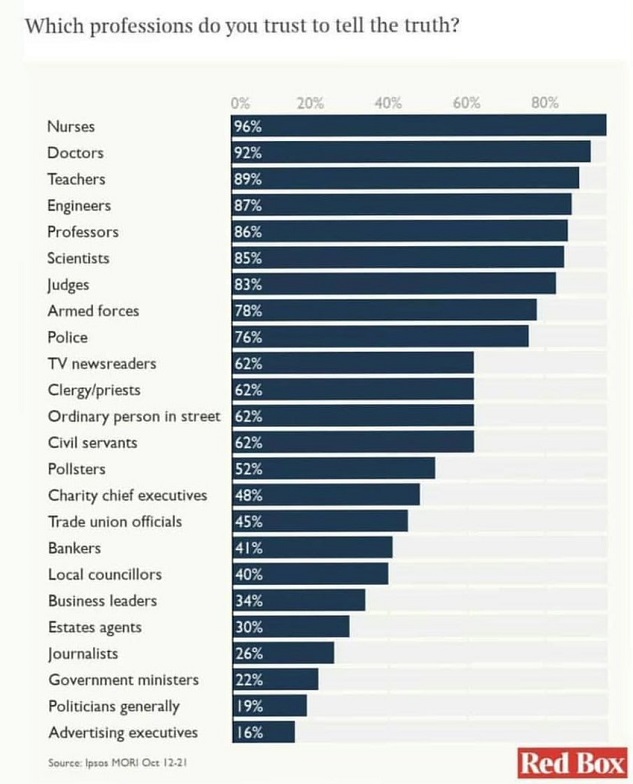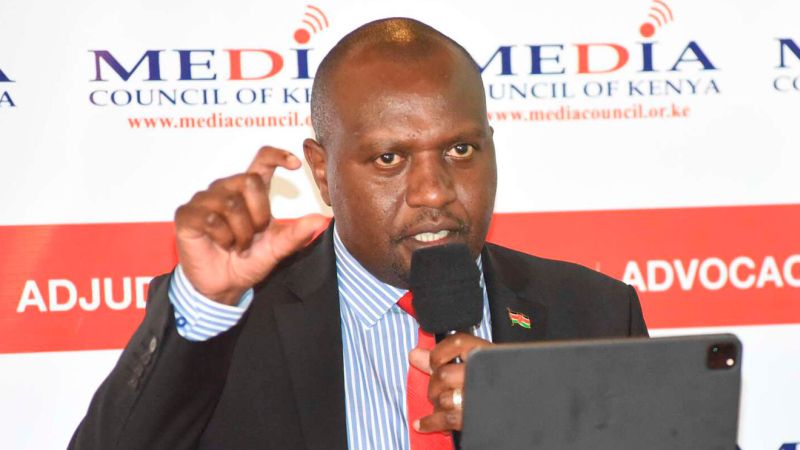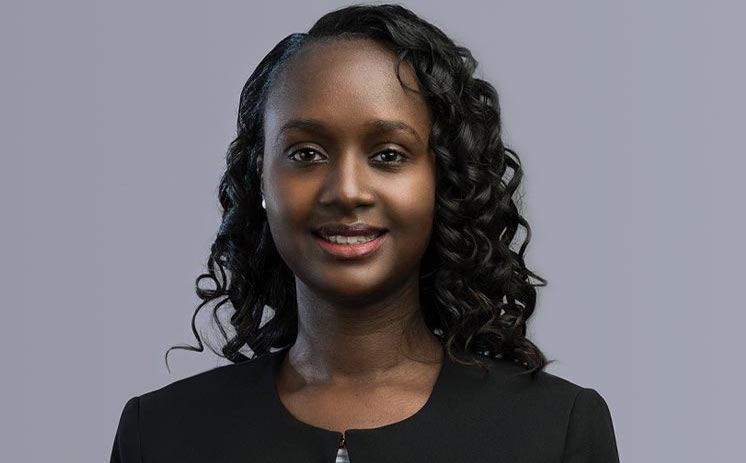Advertising executives rank below politicians as Britain’s least-trusted profession followed by government ministers, journalists and estate agents in that order, the Ipsos MORI Veracity Index 2018 shows.
The Ipsos MORI Veracity Index is the longest-running poll on trust in professions in Britain, having been asked consistently since 1983. The 2018 edition – the 21st wave of the survey series – records the latest movements in Britons’ trust in the key professions we have tracked since the eighties and nineties. It also reveals the public stock of three new professions for this year: engineers, members of the Armed Forces and advertising executives.
Key headlines include:
- Nurses remain the most trusted profession in Britain. This year 96 per cent say they trust nurses to tell the truth, following on from from their already high 2017 score (94%) and four percentage points higher than doctors (92%).
- Advertising executives – a new profession for this year’s list – are the least trusted. Sixteen per cent of the public say they trust ad executives to tell the truth, making them less trusted than politicians (19%) and Government Ministers (22%). Journalists (26%) and Estate Agents (30%) complete the bottom five.
- Engineers rank among Britain’s top five most-trusted professions. Eighty-seven per cent of the British public say they would trust engineers to tell the truth, making them the fourth-most trust profession in the country.
- Seventy-eight per cent of the public would trust a member of the Armed Forces to tell the truth. This makes them the eighth-most trusted profession, placed similarly to the Police, another long-term riser who are on 76% this year (up from 60% in 2009).
- Trust in Civil Servants has risen six percentage points since 2016. This year 62% trust them to tell the truth, up from 56% in 2016 and 59% in 2017. Civil Servants have been the strongest risers across the life of the Veracity Index: since the poll was first asked in 1983, public trust in this profession has risen by 37 percentage points. Other big rises include scientists (up 22 points since 1997) and Trade Union officials (up 27 points since 1983).
- There has been a significant increase in trust in bankers. Trust in bankers has risen ten points over the last five years, from 31% in 2013 to 41% now.
- Trust in priests is the only measure in clear decline over the course of the Veracity Index, falling from 85% in 1983 and continuing to fall from 69% to 62% over the last two years.
- TV news readers see the biggest fall this year, with trust declining five percentage points from 67% in 2017 to 62% now.
Three new professions have been added to the roster for this year of the Index:
- Engineers are one of the most trusted professions in Britain, with 87% saying they trust them to tell the truth. Trust in this profession is especially high among those with degree-level qualifications (91%) and those in social grades AB.
- Trust in members of the Armed Forces is high among men and women and among all age groups. Trust is higher than average among those educated to GCSE level (83%) and is also higher among Conservative Party supporters than Labour party supporters (85% versus 73%).
- Advertising executives are near-uniformly distrusted with just 16% of the public saying they trust them to tell the truth. Trust is slightly higher among the young – Millennials are the most trusting (albeit at only 23%). Rural dwellers are the least trusting: just nine per cent of those living in rural areas of Britain trust ad executives
 The Social Trust Index
The Social Trust Index
Subtracting the average number of professions distrusted from the average number trusted gives us a new measure of aggregate trust – the Social Trust Index. This reveals the influence of socio-demographic factors on trust in professions.
 The top-level story is good news – on average Britons trust 14 of the listed professions and distrust eight. Yet this gap varies by age, life stage and political outlook, among other factors:
The top-level story is good news – on average Britons trust 14 of the listed professions and distrust eight. Yet this gap varies by age, life stage and political outlook, among other factors:
- Generation Z members tend to trust the most professions on average, while Millennials are also relatively trusting. Remain supporters, Convervative Party voters, the middle classes and graduates are also more trusting of professions
- Low scoring groups include people who are widowed, divorced or separated, those who rent their home from a local authority, people with no formal educational qualifications and those in social grades DE.
READ: EQUITY BANK NAMED AFRICAN SME BANK OF THE YEAR
Political affiliation also affects trust, indeed having a political party affiliation is associated with higher levels of trust: Conservative and Labour supporters both score above the national average on the index, although with differences on specific professions, e.g. the Armed forces and Trade Union officials. The impact is different when EU referendum vote is considered: Remain voters are among the highest-scoring groups, while Leave voters score below average.


 The Social Trust Index
The Social Trust Index










1 Comment